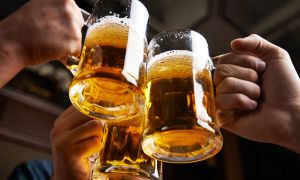Advertisement
Bradycardia generally refers to a steady but slow heartbeat at rest, under 60 beats per minute (although trained athletes can have much slower resting heart rates). A slow heart rate can cause symptoms such as dizziness, shortness of breath, chest pain, or fainting, but most people don't notice any symptoms unless the heart rate dips below 50 beats per minute.
Small amounts of alcohol can speed up the heart rate. Although that doesn't make it a tonic for bradycardia, moderate drinking is safe for most people with bradycardia. Moderate means one or two drinks a day for men, no more than one drink a day for women.
Larger amounts of alcohol all at once (binge drinking) or over time can be toxic to the heart muscle, leading to heart failure or the common rhythm disorder known as atrial fibrillation.
Around the holidays, emergency rooms see a spike in the number of people having a reaction to too much alcohol. Dubbed the "holiday heart syndrome," symptoms include the sensation that the heart is racing or skipping beats (palpitations), sometimes accompanied by pain, pressure, or heaviness in the chest, or shortness of breath. Although a normal rhythm usually returns on its own within 24 hours, some people need a beta blocker to slow the heart or a medication or procedure to restore a normal rhythm.
The holiday heart syndrome can occur with just a drink or two, but it usually takes five, six, or more drinks to trigger it. Too much caffeine or overuse of over-the-counter decongestants can cause similar rhythm problems.
Small amounts of alcohol can speed up the heart rate. Although that doesn't make it a tonic for bradycardia, moderate drinking is safe for most people with bradycardia. Moderate means one or two drinks a day for men, no more than one drink a day for women.
Larger amounts of alcohol all at once (binge drinking) or over time can be toxic to the heart muscle, leading to heart failure or the common rhythm disorder known as atrial fibrillation.
Around the holidays, emergency rooms see a spike in the number of people having a reaction to too much alcohol. Dubbed the "holiday heart syndrome," symptoms include the sensation that the heart is racing or skipping beats (palpitations), sometimes accompanied by pain, pressure, or heaviness in the chest, or shortness of breath. Although a normal rhythm usually returns on its own within 24 hours, some people need a beta blocker to slow the heart or a medication or procedure to restore a normal rhythm.
The holiday heart syndrome can occur with just a drink or two, but it usually takes five, six, or more drinks to trigger it. Too much caffeine or overuse of over-the-counter decongestants can cause similar rhythm problems.
Continue Learning about Alcohol & Health
Important: This content reflects information from various individuals and organizations and may offer alternative or opposing points of view. It should not be used for medical advice, diagnosis or treatment. As always, you should consult with your healthcare provider about your specific health needs.



